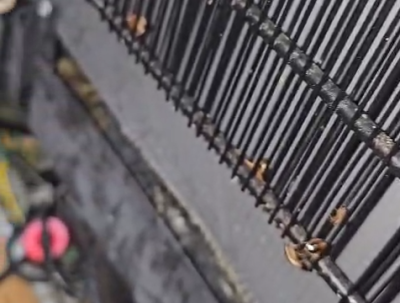When technician Josh Bates was called to treat a cockroach problem, it was far worse than he initially thought. After treating the infestation in the kitchen of a premises in South West London using special pet-friendly gels, Josh was asked to check an upstairs bedroom. To his horror, he found a large number of German cockroaches, many in the nymphal stage. The insects were crawling on and behind the fridge freezer and microwave in the bedroom.
Josh said: “It’s much better for people to have appliances and cooking equipment in a kitchen rather than a bedroom. Food attracts insects and they also like the warmth produced by the appliances and moisture. The cockroaches could have been hiding in an item that was brought into the room and once there would have spread rapidly. With an infestation this bad, the resident would have been living with the cockroaches for quite a while. There was also evidence of cockroaches in the doorframes and wardrobe. My strong advice to the customer was to remove the fridge and microwave the bedroom once we have eliminated the problem.”
Cockroaches can be difficult to identify to the untrained eye as they only come out at night. During the day, they hide around door frames, hinges, clocks, in the back of televisions, and even around fridge motors.
They are most likely to be spotted when a light is switched on in a dark room. This will send them scurrying back to their hiding place. Other signs to look out for are small dark coloured droppings or marks, cockroach-shaped skin cases, a strong musky smell and damage to belongings and food stuffs.
The German cockroach is the UK’s most common type of cockroach. They are very prolific, with the female producing an ootheca that she carries for a month and from which 30-40 miniature cockroaches or nymphs will hatch. Depending on conditions, the new generation can be ready to breed within 6 weeks to 6 months. Therefore, if you have only a single pair of cockroaches at the start, you will very soon find yourself with a heavy infestation.
The German cockroach loves hot and humid environments, such as kitchens. They have wings, but rarely fly, and are mostly active at night.
Cockroaches can convert anything that is animal or vegetable into food. Good hygiene is therefore the first line of defence against an infestation and properties need to be properly cleaned, particularly in food areas. Insect-proof storage is also important.
Cockroaches are known carriers of diseases such as Salmonella, Dysentery and Gastroenteritis and their droppings have been linked to increases in eczema and asthma.
For expert advice and a free survey contact Cleankill Pest Control on 020 8668 5477. www.cleankill.co.uk
ENDS
Watch footage of the infestation on our YouTube channel.
